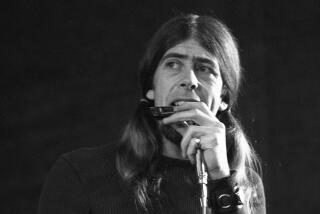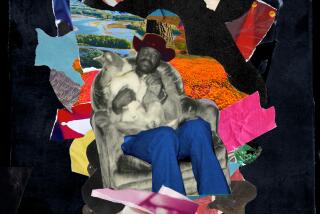The Only Blues Is in the Music : The John Lee Hooker revival is in full swing
VALLEJO — They call him the Ironman. He eats barbed wire. He gargles gasoline. He’s one tough character.
So when Pete Townshend began producing his new concept album based on Ted Hughes’ children’s story, “Ironman,” he knew there was only one singer whose voice could bring the title role to life: John Lee Hooker.
“I always knew that the Who were A-one fans of mine,” Hooker said recently, in his low growl. “But I didn’t think Pete was fool enough to ask me to try singing something I was so unfamiliar with. ‘Ironman’ is not blues, it’s what you might call pop. This is something Pete wrote. Something I would have never thought of.”
“Ironman,” due out in June on Atlantic Records, is only the latest in a series of recent Hooker-related projects. The DCC label has just released the “John Lee Hooker 40th Anniversary Album,” a set of 15 songs (12 of them previously unreleased) recorded between 1948 and ’61.
The King of the Boogie also has a new album in the can, featuring contributions from a stellar cast of contemporary heavies: Los Lobos, Robert Cray, Carlos Santana, Bonnie Raitt, George Thorogood, Charlie Musselwhite, Larry Taylor. Hooker’s booking agent, Mike Kappus, is in the midst of negotiations with an independent label and predicts a summer release for Hooker’s first new LP since 1984’s “Jealous.”
“I think the new album will make people more aware of how vital John Lee’s talents are,” said Kappus, head of the Rosebud Booking Agency. “Our intention was not to go all-out for star power, but to involve artists who really loved John, people who were essentially friends and fans. The result is a record which not only illustrates John’s significant influence and stature within the music community, but it also demonstrates what an extremely sharp and active performer he still is.”
Produced by Delta blues aficionado Roy Rogers and tentatively titled “The Healer,” it’s Hooker’s 110th album.
Van Morrison was originally slated to produce the LP, but had to back out due to scheduling conflicts. “There is nobody even remotely like John,” Morrison--a lifelong Hooker fan and a close friend--said during a phone interview from England. “The man is a real (one of a kind). He is a window into another age.”
Says Los Lobos’ David Hidalgo: “The first time I heard him growl, my jaw hit the floor. All that power and emotion. That big old voice, man, it’s unbelievable.”
This powerful legend leads a quiet suburban life. He recently moved into a new two-story house here on a hilltop overlooking the San Francisco Bay. Except for a few vehicles in the driveway sporting license-plate inscriptions like “DOC HOOK” and “LES BOOGY,” there are no signs that this is the residence of an international blues superstar.
“I don’t do nothin’ real fast no more. Nothin’ heavy,” Hooker said. “Mostly, my daily life is about relaxin’, like I’m doin’ now. Just kickin’ back in common clothes and bein’ happy.”
Dressed in a burgundy suit, black suspenders and a white polka-dot shirt, Hooker appeared relaxed and youthful. Cuing up a tape of “The Healer” on a ghetto blaster, he leaned back and pointed at the speaker.
“My songs are like poetry. Some are pretty heavy--so heavy I can hardly carry them,” Hooker said. “Sometimes on stage, when I’m singing them, it gets so sad and deep and beautiful, I have to wear dark glasses to keep the people from seeing me crying. I’m not kidding. The tears just start running. With the words that I’m saying and the way I sing it, sometimes I give my own self the blues.”
Seemingly unaffected by his legendary status, Hooker laughed and joked throughout much of a two-hour interview. Clearly excited about his new work, he often stopped in mid-sentence to point out some subtle detail on the tape that still moved him.
“You know, I may not be too good at writing things down, but when it comes to creating a song from here”--he pointed to his heart--”and here”--now to his head--”nobody can beat me.”
Many of the three-minute psychodramas he has written over the past four decades are essential parts of the blues lexicon. Songs like “I Cover the Waterfront” and “Bad Like Jesse James” certainly expanded the parameters of blues subject matter. Sex, violence, guilt, revenge--Hooker has written about it all. But the topic that stirs his interest the most is love.
“Love does strange things to people,” Hooker said. “It can get a hold on you and cause some serious damage. Like dope. Maybe even worse than dope. People talk about money, but money doesn’t matter. You can have this room full of money, but that money cannot hug you at night. That money cannot talk to you or dress up and look good for you. You got to have love.”
A three-time divorce, the blues patriarch currently shares living quarters with members of his band. A satellite dish in the back yard and big-screen TV in the dining room help him keep tabs on world events and pop culture. Hooker is an avid Western movie buff and a big Michael Jackson fan. But his true love is baseball.
Not only does he catch every televised game he can, but Hooker also keeps multiple radio stations tuned in on separate receivers to monitor as many games as possible.
But he doesn’t enjoy staying cooped up for too long.
“I don’t hide out. I like to get out in the car and go,” Hooker said. “To the store, to the little restaurants around here. Sometimes people who recognize me are shocked when they see me in these little places. They say like, ‘What is he doin’ here?’ Well, I’m human, I like to eat.”
Born in 1917 in Mississippi’s Coahoma County, Hooker developed his vocal style singing spirituals in his preacher father’s Baptist church. When his parents divorced, he went to live with his mother and stepfather, a popular blues guitarist on the Delta named Will Moore.
“The style that I’m playing now, my stepfather taught me when I was around the age of 12 years old,” Hooker said. “No other guitar player sounded like him and because my style came from him, no other guitar player sounds like me.”
While still a teen-ager, Hooker left the Mississippi Delta and drifted north to Memphis and Cincinnati, finally settling down in Detroit in 1943. Working factory jobs by day and performing music at night, Hooker soon became a fixture at clubs on Detroit’s famed Hastings Street.
He acquired his first electric guitar in 1947, a pawn-shop gift from local legend T-Bone Walker. “T-Bone was the greatest on electric guitar,” Hooker said. “I used to follow him around like a puppy.”
In 1948, he burst on the R&B; scene with his first big hit, “Boogie Chillen’.” A one-man band, Hooker developed his trademark sound with a raunchy guitar and a stomping foot. His hypnotic rhythm patterns practically defined the classic bar-band idiom widely known now as boogie music.
A string of hits on Modern and Vee-Jay Records followed. Songs like “I’m in the Mood,” “Crawlin’ King Snake” and “Hobo Blues” established Hooker’s terse electric style.
“What’s really cool about John Lee is that when he tells a story, the lyrics dictate what he does with the music,” young blues star Robert Cray observed. “Most blues artists tend to restrict themselves within a standard 12-bar structure. But with John Lee, there aren’t any rules in music.”
During the ‘60s folk renaissance, Hooker introduced himself to the young, white audience when he began headlining coffeehouses and clubs. He also shared the spotlight at the Newport Folk Festival with a young singer named Bob Dylan.
During this period, Hooker lived in London. Working with John Mayall’s Bluesbreakers (featuring Eric Clapton and Peter Green on guitars) as a backup band, he toured Europe repeatedly. In those days, aspiring rockers like Pete Townshend and David Bowie were indefatigable followers. The Rolling Stones frequently opened his shows, and the Animals scored a hit with their remake of his “Boom Boom.”
On the road, Hooker prefers playing small bars and coffeehouses to big halls and outdoor arenas. “The reason why is because I can be right down with my people that love me. I’m playin’ for them, face to face. After the show, if I want to have a beer with them, I can sit down anywhere and just talk.”
Understatement has always been John Lee Hooker’s strongest card. To hear him tell it, the kind of blues he sings came into being long before there ever was a Detroit or a Chicago or a Mississippi Delta. They date back to the Garden of Eden.
“When Adam and Eve first saw each other, that’s when the blues started,” Hooker said. “No matter what anybody says, it all comes down to the same thing: a man and a woman, a broken heart, a broken home. You know what I mean?”
More to Read
The biggest entertainment stories
Get our big stories about Hollywood, film, television, music, arts, culture and more right in your inbox as soon as they publish.
You may occasionally receive promotional content from the Los Angeles Times.










